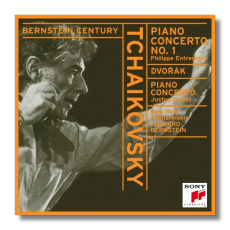
The Internet's Premier Classical Music Source
Related Links
-
Dvořák Reviews
Tchaikovsky Reviews - Latest Reviews
- More Reviews
-
By Composer
-
Collections
DVD & Blu-ray
Books
Concert Reviews
Articles/Interviews
Software
Audio
Search Amazon
Recommended Links
Site News
 CD Review
CD Review
Bernstein Century

- Piotr Ilyitch Tchaikovsky:
- Concerto for Piano #1 in B Flat minor, Op. 23 (1875)
- Antonín Dvořák:
- Concerto for Piano in G Major, Op. 33 (1876) *
Philippe Entremont, piano
* Justus Frantz, piano
New York Philharmonic Orchestra/Leonard Bernstein
Sony Classical SMK61828 ADD 76:28
It is really fascinating to compare this 1961 recording of the Tchaikovsky concerto with one that Bernstein made 12 years later with pianist André Watts (Sony Classical SMK47630). Obviously, different pianists are going to bring different interpretations to the music, but I can't help wondering to what extent the differences between the two recordings are a function of the conductor and his changing relationship with the music. In 1961, Entremont and Bernstein are remarkably plainspoken; they move through this ever-popular concerto with skill and efficiency. While it's not exactly an unloving reading, it's not one that caters to the music's Romantic whims, either. I can imagine it being a good choice for listeners who think that Tchaikovsky's concerto is, well, kind of silly. In contrast, Watts and Bernstein treat the concerto as if it were a Romantic manifesto: tempi are broad and every phrase is caressed to yield the maximum of expression. It makes you want to take an hour-long bubble bath. Funny thing is, Watts's technique doesn't always keep pace with his expressive goals – some of his playing sounds a little stretched. Entremont's playing is more dependable, but then Bernstein isn't constantly goading him, unlike Watts, into display mode. The sonics on the later recording are definitely superior, although the engineering here certainly is tolerable. If nothing else, this recording shows once again how Lenny was unlikely to do the same thing twice.
The Dvořák, like the Entremont Tchaikovsky, is new to CD. It was recorded in 1975 in Columbia Records's 30th Street Studio. Here, Bernstein is joined by Justus Frantz, and together, they do what they can with this concerto, which is one of the composer's near-misses. Nevertheless, they are consistently well behaved, almost as if they were afraid that too much temperament and rough-housing would fracture the score's elusive qualities. This recording, then, is a good partner for the similarly straightforward Tchaikovsky. Both remind one that Bernstein could be a good concerto-partner, but that his legendary status came not from being supportive but from being the center of attraction – not that there is anything wrong with that, if you're Leonard Bernstein.
Copyright © 1999, Raymond Tuttle




















